Essay: Mediation in and for organisations.
In favour of strategic and future-oriented conflict management.
Part 2 – Functional change and practical concept
in: Perspective Mediation 4/2019
Dr Sascha Weigel
This is the second part of the article "Mediation in and for organisations", which develops the thesis that mediation as a conflict management process in organisations is an "organisational event". It does not only take place for the personal benefit of those directly involved, but also serves the commissioning organisation. If this development is successful, the mediation process is an interesting alternative to conventional conflict management processes for organisations that are exposed to the permanent pressure to innovate and change in the VUCA world (Part 1).
What is remarkable about the question of job development is that digitalisation hardly creates any jobs for unskilled, low-skilled workers, as was the case with the Industrial Revolution. It may be a certain irony of history that the industrial revolution displaced highly skilled craftsmanship by breaking down work into the smallest steps and assigning it to unskilled workers who no longer had to think and be skilled, but were expected to perform a single action hundreds of times a day, while in the digital transformation these typical routine jobs are being eliminated and assigned to a few highly skilled digitisers.
As in the past, these changes in the world of work will lead to fear-driven potential for conflict, for which management, the general team spirit or the organisational culture will be held responsible. What is significant, however, is that the directly perceptible embodiments of these fears will be concrete interaction partners, but will probably be eliminated as conflict partners. Looms can be destroyed in a rush, but what do you want to do about software if you don't even know where the plug is? If the future is "good", we will interact with AI systems as we would with humans, but if things go badly, we probably won't be able to argue with them. Alternatively, we will get used to not only talking to animals and sharing our thoughts, worries and fears with them, but also with the interacting machines (in) the future. And what will this mean for the way we deal with our emotions and rationality when algorithmically sophisticated interaction partners become our conflict partners? Or are we actually arguing with the programmers and data collectors? As indicated, it was one thing to destroy the looms in the 19th century or to scream in rage at the DOS-powered PCs in the 20th century, but it will be quite another to want to settle our "feelings of conflict" with an AI system of the 21st century: Where to put the fear, anger and rage as well as the incomprehension and disbelief of interaction partners or machines to which we are quick to attribute human traits and characteristics, but which are ultimately not human? What will still be a technical problem in the future and what will be an interacting conflict between social entities?19 Perhaps AI systems will turn out to be the "better" conflict partners or even teachers after all.
Take a look at this website, an artificial intelligence that provides psychological counselling: https://www.x2ai.com
Complete bibliography for the essay:
Alexander, Nadja: The high-wire act of mediation – an international perspective, in: in: Journal for Conflict Management and Mediation, 2017, p. 164 – 168.
Bannink, Frederike: Praxis der Lösungs-fokussierten Mediation. Concepts, methods and exercises for mediators and managers, Stuttgart 2009.
Bannink, Frederike: Solution-focussed questions. Handbook for solution-focused dialogue, Göttingen 2015.
Bischoff, Kathrin (2014): Über den Einfluss des Strategie eines Unternehmens auf die Konfliktdynamik in Wirtschaftsmediationen, in: Konfliktmanagement in der Wirtschaft. Approaches, models, systems. ed. by Gläßer, U./Kirchhoff, L./Wendenburg,F., Konfliktmanagement in der Wirtschaft, Baden Baden 2014, p. 439 – 456.
Breidenbach, Stephan (1995): Mediation - structure, opportunities, risks of mediation in conflict, Cologne 1995
British Academy: The Global Finance Crisis – why didn't anybody noticed?, British Academy review issue 14, November 2009, https://www.thebritishacademy.ac.uk/sites/default/files/03-Besley.pdf. last accessed 4.01.2019.
Brynjolfsson, Erik / McAffee, Andrew: The Second Machine Age. How the next digital revolution will change all our lives, Kulmbach 2014.
Busch, Dominic/Mayer, Claude-Hélène: Intercultural mediation. State of research and open questions within a mediation science, in: Kriegel-Schmidt, Mediation als Wissenschaftszweig, ed. by Kriegel-Schmidt, Wiesbaden 2017, p. 179 – 189.
Bush, Robert A. Baruch/Folger, Joseph P.: Conflict - Mediation and Transformation, Weinheim 2009.
Christian, David: Origin Story. A Big History of Everything, New York 2018.
Christakis, Nicholas A./Fowler, James H.: Connected! The power of social networks and why happiness is contagious, Frankfurt am Main, 2010.
Curry, Andrew: The Internet of animals, in: Nature, Vol. 562, p. 322-326, 18 October 2018, https://www.nature.com/articles/d41586-018-07036-2.
Daugherty, Paul/Wilson, James (2017): Human + Machine. Artificial intelligence and the future of work, Munich 2018.
Dörflinger-Khashman, Nadia (ZKM 2013): Fragekompetenz in der Mediation, in: Zeitschrift für Konfliktmanagement und Mediation, 2013, 148-151.
Duss-von Werdt, Joseph (2005): homo mediator. Geschichte und Menschenbild der Mediation, Stuttgart 2005.
Fukuyama, Francis (1992): The end of history. Where do we stand?, Munich 1992.
Floridi, Luciano (2015): The 4th revolution. How the infosphere is changing our lives. Frankfurt 2015.
Glasl, F. (ZKM 2007): Metanoic mediation - sustainable conflict management, in: in: Journal for Conflict Management and Mediation (until 1999: Kon:sens), 2007, pp. 103 - 107, 153 - 157.
Graeber, David: Bullshit Jobs – On the true meaning of work. Frankfurt am Main 2019.
Guwak, Barbara / Strolz, Matthias (2012): Die Vierte Kränkung. wie wir uns in einer chaotischen Welt zurechtfinden müssen, Berlin 2012.
Hager, G. (2001): Konflikt und Konsens: Überlegungen zu Sinn, Erscheinung und Ordnung der alternativen Streitschlichtung, Tübingen 2001.
Hell, Matthias: Deutschland Einwanderungsland? The Immigration Discussion 1998 – 2002, Bielefeld 2005.
Harari, Yuval Noah (2015): A brief history of humanity, 5th edition, Munich 2015.
Harari, Yuval Noah (2107): Homo Deus. A History of Tomorrow, Munich 2017.
Harari, Yuval Noah (2018): 21 Lessons for the 21st Century. London 2018.
Hidalgo, Cesar (2016): Growth works differently. From the smallest particles to people to networks, Hamburg 2016.
Hofstetter, Yvonne (2014): They know everything. How intelligent machines are invading our lives and why we must fight for our freedom, 2nd edition, Munich 2014.
Horx, Matthias (2011): The Megatrend Principle. Wie die Welt von morgen entsteht, Munich 2011.
Höland, A. / Meller-Hannich, C. (ed.): Nothing to complain about? The decline in the number of lawsuits filed in the judiciary, possible causes and consequences, Baden Baden 2016.
Hölscher, LucianThe discovery of the future, Göttingen 2016.
Huntington, Samuel P. (1996): Clash of civilisations. The reorganisation of world politics in the 21st century. Europa-Verlag, Munich, Vienna 1996.
Keese, Christoph (2014)Silicon Valley. What the world's most powerful valley has in store for us, Munich 2014.
Keese, Christoph (2016): Silicon Germany. How we are managing the digital transformation, Munich 2016.
Kerntke, Wilfried (2018): How goats and fish learn to fly. The developmental power of conflicts in companies, Berlin 2018.
Kleiner, Susanne (SdM 70/2017): Mediation in transition. Adding value to corporate culture, in: Spektrum der Mediation, No. 70, 4/2017, p. 30 – 32.
Knight, Will: AI with emotional intelligence, in: Technology Review, 02/02/2017, https://www.heise.de/tr/artikel/KI-mit-emotionaler-Intelligenz-3613884.html, last opened 16.02.2019.
Kollmann, Tobias / Schmidt, Holger (2016): Germany 4.0, How the digital transformation succeeds, Wiesbaden 2016.
Krabbe, Heiner (ZKM 2014): Workshop report – The art of questioning, in: Journal of Conflict Management and Mediation, 2014, 186-188.
Kühl, Stefan (wiwe 2016): The four blind spots of "Theory U", in: wirtschaft+weiterbildung, 2016, pp. 24-29.
Luhmann, N. (1993): The Law of Society, Frankfurt am Main 1993.
Luhmann, N. (IP 1987): What is communication, in: Information Philosophie, 1987, p. 5 - 16.
Luhmann, N. (Legal Theory 1986): Die Codierung des Rechtssystems, in: Rechtstheorie. Zeitschrift für Logik, Methodenlehre, Kybernetik und Soziologie des Rechts, vol. 17, Berlin 1986, pp. 171 - 203
Matzler, Kurt/Bailom, Franz/von den Eichen, Stephan Friedrich/Anschober, Markus: Digital disruption. How to prepare your company for the digital age, Munich 2016.
Mohr, G. (2006): Systemic organisational analysis. Dynamics and fundamentals of organisational development, Bergisch Gladbach 2006.
Mohr, G. (2006a): Dynamic Organizational Analysis, in: Growth and Change for Organisations, Transactional Analysis. New Developments 1995 – 2006, ed. by Mohr, G. / Steinert, Th., Pleasanton 2006.
Mohr, G. (2014): Die Beachtung der Systemdynamiken für die Vermittlungsarbeit im Rahmen des betrieblichen Konfliktmanagements, in: Weigel, S. (ed.): Theorie und Praxis der Transaktionsanalyse in der Mediation, Baden-Baden 2014, p. 455 – 468.
Morris, Ian (2012): Who rules the world? Why civilisations rule or are ruled. Frankfurt am Main/New York 2012.
Nünning, Ansgar: Vielfalt der Kulturbegriffe, in: http://www.bpb.de/gesellschaft/bildung/kulturelle-bildung/59917/kulturbegriffe last accessed 12/02/2019.
O'Neil, Cathy (2017): Attack of the algorithms. How they manipulate elections, destroy career opportunities and jeopardise our health, Munich 2017.
Osterhammel, Jürgen (2009): The transformation of the world. A History of the 19th Century, Munich 2009.
Osterhammel, Jürgen / Petersson, Niels (2012): History of Globalisation. Dimensions, Processes, Epochs, 5th edition, Munich 2012.
Pinker, Steven: Violence. A new history of humanity, Frankfurt am Main, 2013.
Pinker, Steven: Enlightenment now. The case for Reason, Science, Humanism, and Progress, New York 2018.
Rieforth, Joseph: Process design for change in organisations. The nine-field model as a reflexive space for new developments, in: Konfliktdynamik, 2012, 328-339.
Rössler, Beate (2017): Autonomy. An attempt at a successful life, Berlin 2017.
Rosling, Hans (2018): Factfulness. How we learn to see the world as it really is, 7th edition, Berlin 2018.
Saunders, Doug: Arrival City. The new migration of peoples. Munich 2013.
Scharmer, Otto C. (2011): Theory U. Von der Zukunft her führen, Original 2007, Heidelberg 2011.
Thomas, Alexander: Handbuch Interkulturelle Kommunikation und Kooperation. Volumes 1 and 2, Vandenhoeck & Ruprecht, 2009.
Thompson, Derek (The Atlantic 2012): The 100 Year March of Technology in one Graph, in: The Atlantic, April 2012, https://www.theatlantic.com/technology/archive/2012/04/the-100-year-march-of-technology-in-1-graph/255573/.
Trentmann, Frank (2016): Herrschaft der Dinge. The history of consumption from the 15th century to the present day, Munich 2016.
Vertesi, Janet: What robots in space teach us about teamwork: A deep dive into NASA, in: ethnography matters, 7 July 2016, available at https://ethnographymatters.net/blog/2016/07/07/what-robots-in-space-teach-us-about-teamwork/.
Weigel, Sascha (2014): Mediation as a conflict management process. Starting points for mediation based on transactional analysis, in: Theorie und Praxis der Transaktionsanalyse in der Mediation. A handbook. ed. by Sascha Weigel, Baden Baden 2014, p. 17 – 37.
Weigel, Sascha (SdM 2017): Strategic mediation. Plea for an overdue change of perspective – Part 1, Spektrum der Mediation, 70/2017. p. 18-22.
Weigel, Sascha (KD 2017): Transformative mediation and transactional analysis, supporting transformative mediation with concepts of transactional analytical counselling, in: Konfliktdynamik 01/2017, pp. 34-44.
Weigel, Sascha (2017): Why mediation now?! An interdisciplinary discussion of a contemporary historical phenomenon, in: Kriegel-Schmidt, Mediation als Wissenschaftszweig, ed. by Kriegel-Schmidt, Wiesbaden 2017, p. 143 – 159.
Weigel, Sascha (SdM 2018): The strategic mediation. Mediation and capitalism – Part 2, Spektrum der Mediation, 71/2018. p. 26-30.
Weigel, Sascha: Conflict management in the public administration of the activating state with transactional analysis and transaction-analytically based mediation. Also a comparative contribution to the treatment of social conflicts by means of law and mediation, Berlin 2012.
Carpenter, Olaf (2011): Intercultural education - actually a matter of course? http://www.bpb.de/gesellschaft/bildung/kulturelle-bildung/60110/interkulturelle-bildung?p=all last accessed on 5 January 2019.

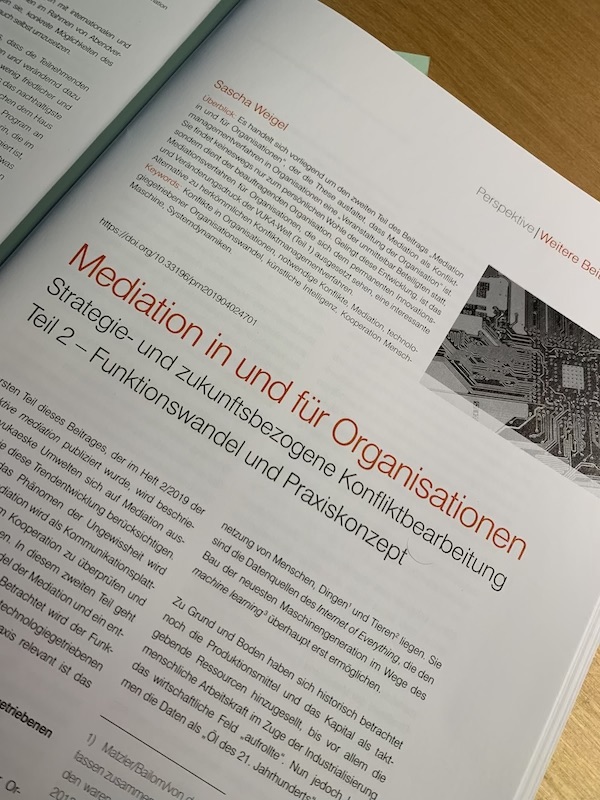
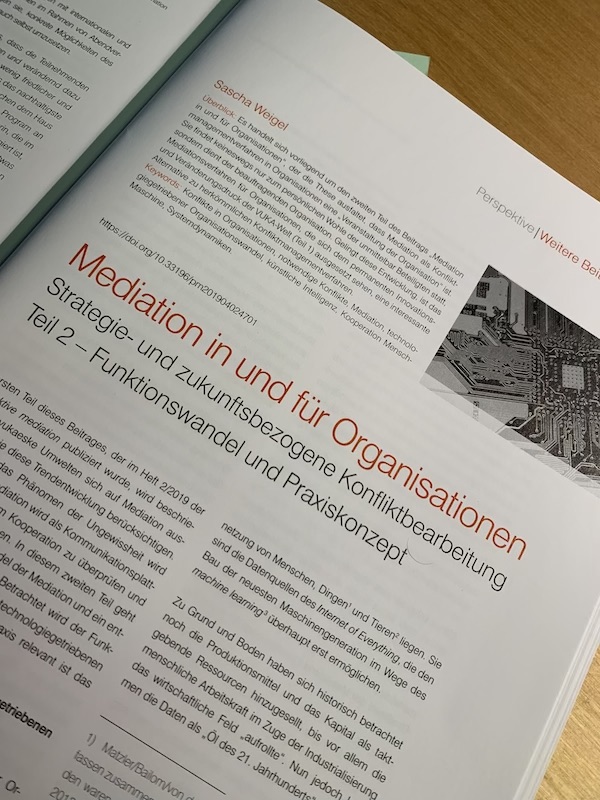
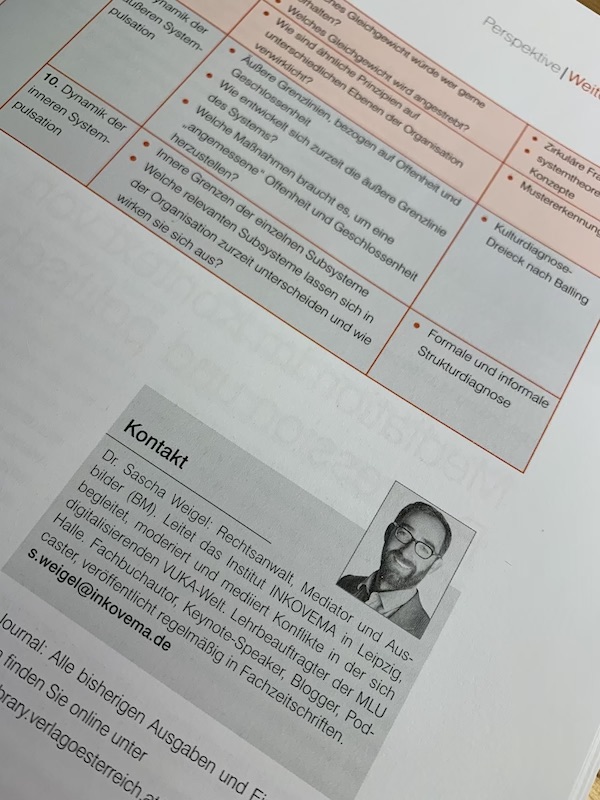
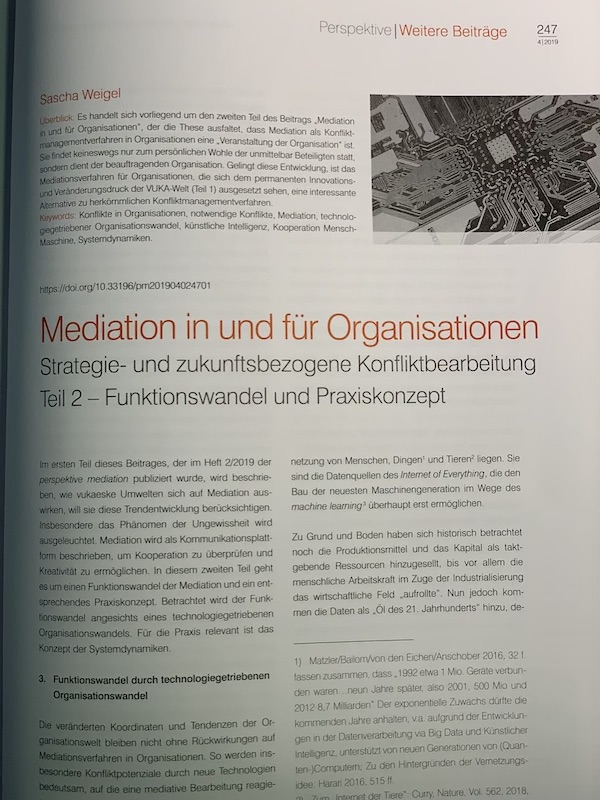
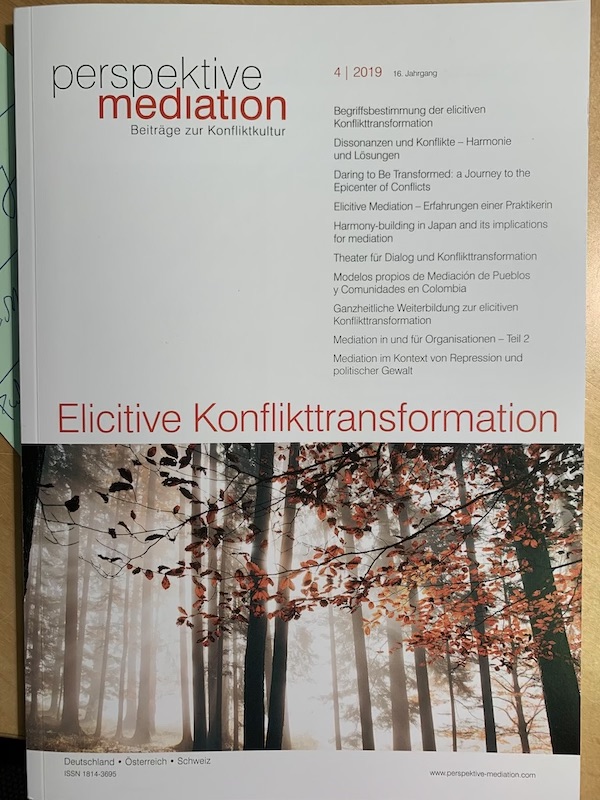

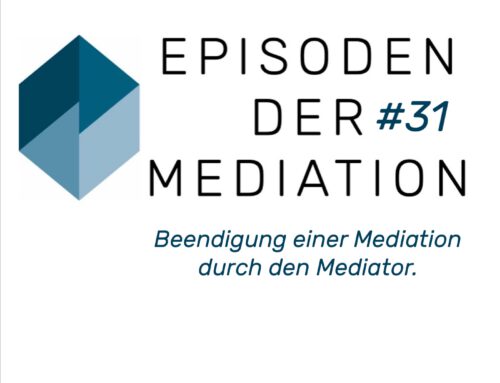
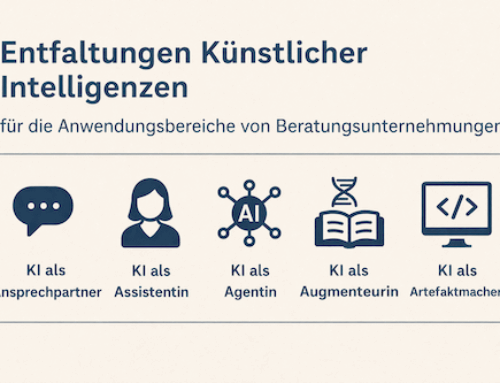
Leave A Comment